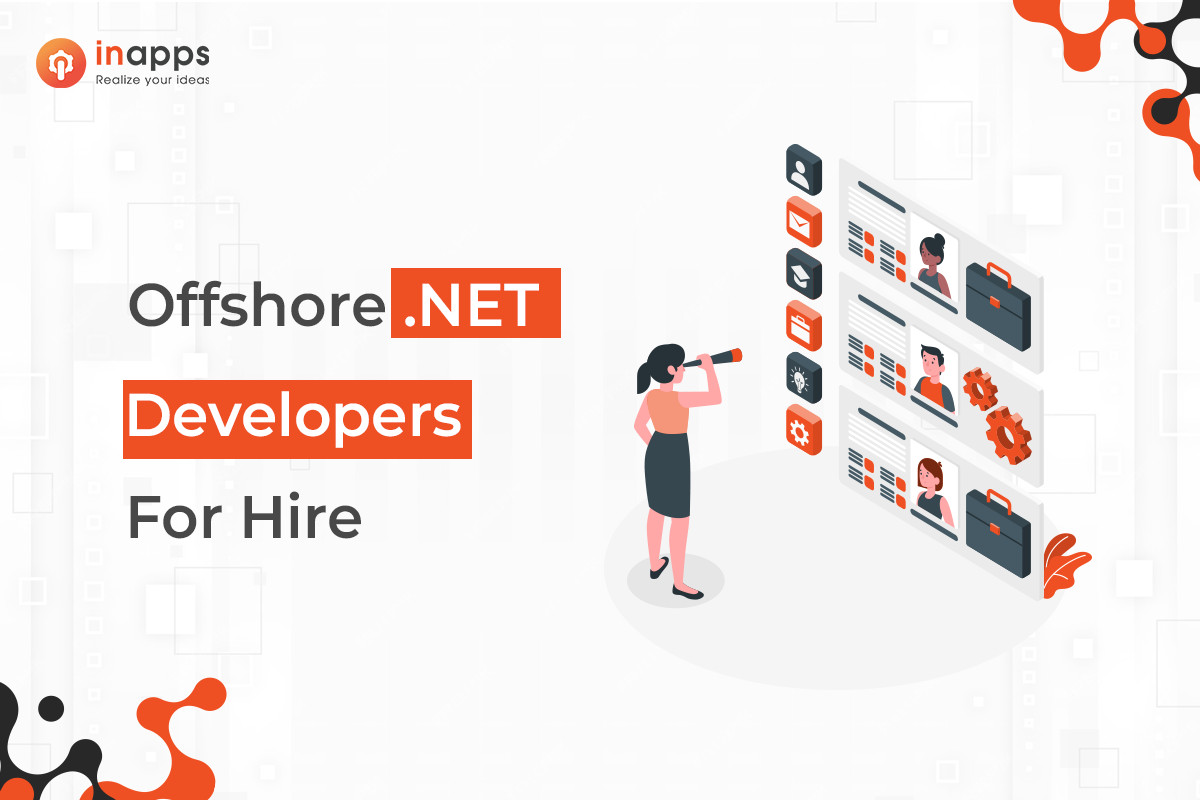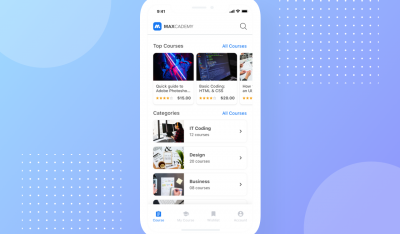- Home
- >
- Offshore News
- >
- Complete Guide To Hiring Top Offshore Net Developers
Hiring offshore .NET developers can be a game-changer for your business, offering access to top-tier talent at a fraction of the cost. But how do you ensure you’re getting the best?
This blog will guide you through the essential steps to hire skilled offshore .NET developers, from assessing their technical expertise and communication skills to ensuring they fit seamlessly with your team’s culture. By the end, you’ll have a clear roadmap to finding and integrating the right offshore talent for your projects.
Key Summary
- Overview: The article provides a comprehensive guide to hiring top offshore .NET developers, focusing on strategies, best practices, and considerations for successful collaboration, as presented by InApps Technology in 2022.
- Key Points:
- Why Offshore .NET Developers:
- Cost Efficiency: Offshore hiring, especially in regions like Vietnam, offers high-quality talent at lower rates compared to onshore markets.
- Access to Talent: Global pool of skilled .NET developers proficient in C#, ASP.NET, .NET Core, and related technologies.
- Scalability: Quickly scale teams for .NET projects like web apps, APIs, or enterprise solutions.
- Key Steps in Hiring:
- Define Requirements:
- Specify project needs (e.g., web development, cloud integration).
- Outline technical skills: C#, .NET Framework/Core, Blazor, Entity Framework, Azure.
- Identify soft skills: communication, teamwork, problem-solving.
- Choose the Right Location:
- Popular hubs: Vietnam (cost-effective, skilled talent), India, Eastern Europe.
- Consider time zone alignment, language proficiency, and cultural fit.
- Select a Hiring Model:
- Freelancers: For short-term, small tasks.
- Dedicated Teams: For long-term projects via outsourcing firms (e.g., InApps).
- Staff Augmentation: Add developers to existing in-house teams.
- Screening Process:
- Review resumes for .NET experience and certifications (e.g., Microsoft Certified: Azure Developer).
- Conduct technical interviews with coding tests (e.g., LeetCode, HackerRank).
- Assess communication via video interviews.
- Partner with a Vendor:
- Choose reputable offshore firms with proven .NET expertise.
- Evaluate vendor portfolios, client reviews, and delivery processes.
- Define Requirements:
- Best Practices:
- Clear Communication:
- Use tools like Slack, Microsoft Teams, or Jira for collaboration.
- Schedule overlapping hours for real-time sync across time zones.
- Agile Methodology:
- Implement Scrum or Kanban for iterative development and transparency.
- Conduct regular sprints and reviews to track progress.
- Cultural Alignment:
- Foster mutual respect through cultural training and team-building.
- Align on work expectations (e.g., deadlines, feedback style).
- Security and Compliance:
- Sign NDAs to protect intellectual property.
- Ensure compliance with data protection laws (e.g., GDPR).
- Use secure tools (e.g., GitHub Enterprise, VPNs).
- Clear Communication:
- Tools and Technologies:
- Development: Visual Studio, .NET 6, Azure DevOps.
- Testing: xUnit, NUnit, Selenium for .NET apps.
- CI/CD: Azure Pipelines, GitHub Actions.
- Common Challenges:
- Time Zone Differences: Can delay communication; mitigated by async updates and overlap hours.
- Quality Control: Requires rigorous testing and code reviews.
- Cultural Misunderstandings: Addressed through clear expectations and training.
- Why Offshore .NET Developers:
- Use Cases:
- Building enterprise-grade .NET web applications or APIs.
- Migrating legacy systems to .NET Core for cloud compatibility.
- Developing scalable SaaS platforms with Azure integration.
- Benefits:
- Reduces development costs by 30-50% compared to onshore hiring.
- Accesses specialized .NET skills for complex projects.
- Accelerates time-to-market with dedicated, scalable teams.
- Conclusion: In 2022, hiring top offshore .NET developers, as outlined by InApps Technology, involves defining clear requirements, choosing reliable vendors, and implementing effective communication and Agile practices to leverage cost-effective, skilled talent while overcoming challenges like time zones and quality control.
1. What does a net developer do?
.NET is a software framework developed by Microsoft in the early 2000s. It provides a platform for building and running applications on Windows. Hence, a .NET developer is a software engineer who creates and maintains applications using the .NET framework by Microsoft.

Here are their main tasks:
1) Designing and Developing Applications
- Understanding Requirements: Work with stakeholders to understand what the business needs.
- Creating Architectures: Design the structure of the software.
- Writing Code: Use languages like C#, VB.NET, or F# to write code.
- Testing and Debugging: Ensure the application works correctly through various tests.
2) Maintaining and Enhancing Applications
- Bug Fixing: Identify and fix issues in the software.
- Performance Optimization: Make the application run faster and more efficiently.
- Adding Features: Implement new features as required by users.
3) Database Management
- Designing Databases: Create and structure databases.
- Writing SQL Queries: Retrieve and manage data efficiently.
- Ensuring Data Integrity: Keep data secure and accurate.
Besides, offshore net developers also write secure code and perform regular security audits to protect applications. They also work with project managers to meet goals, UI/UX designers for user-friendly designs, QA testers to fix issues, and other developers to maintain code quality.
2. Tips to hire offshore net developers
2.1 Assess Technical Expertise Thoroughly
When hiring offshore .NET developers, you must evaluate their technical skills comprehensively. Ensure they have a strong grasp of the .NET framework, including languages like C# and VB.NET, and technologies like ASP.NET, MVC, and Entity Framework.
You can do this by asking candidates to solve real-world problems using .NET during the interview process. For instance, request them to build a small web application that includes CRUD operations using ASP.NET Core and Entity Framework. This will give you insight into their coding style, problem-solving approach, and familiarity with essential .NET components.
2.2 Evaluate Communication Skills
Effective communication is vital when working with offshore teams. Developers need to understand requirements clearly, ask pertinent questions, and provide regular updates.
You can do this by creating realistic scenarios and observing how developers handle client requests, questions, and challenges. This way, you can understand their communication style, problem-solving skills, and ability to manage expectations. It ensures you hire developers who can write code and explain technical concepts clearly to non-technical stakeholders.
2.3 Check for Experience with Remote Work Tools
Offshore net developers should be adept at using remote collaboration tools such as Git for version control, JIRA for project management, and Slack or Microsoft Teams for communication. During the hiring process, ask candidates about their experience with these tools. You can also set up a trial period where the developer works on a small project, utilizing these tools to see how efficiently they manage their tasks and communicate with the team.
2.4 Cultural Fit and Work Ethic
Cultural fit is an often overlooked aspect but is essential for any harmonious working relationship, be it onshore or offshore. Understanding and aligning with the work ethic, values, and practices of your organization can significantly impact productivity and job satisfaction.
According to a study by SHRM, cultural fit can reduce employee turnover by up to 27%. During interviews with offshore net developers, ask questions about their preferred work style, how they handle deadlines, and their approach to teamwork. Additionally, consider arranging informal meetings or virtual coffee sessions with your existing team to observe interactions and ensure a good cultural match.
3. Where to find offshore net developers?

3.1 Offshore Development Companies
Companies specializing in offshore development offer teams of experienced developers. These companies provide vetted professionals who are ready to start on your projects immediately.
| Pros | Cons |
|
|
3.2 Freelance Platforms
Websites like Upwork, Freelancer, and Toptal are great places to find individual .NET developers. These platforms allow you to post job descriptions and review candidates’ profiles, portfolios, and client reviews.
| Pros | Cons |
|
|
On Upwork, you can filter candidates by skill level, hourly rate, and feedback score. For instance, searching for “.NET developer” might yield profiles with extensive experience in C#, ASP.NET, and other related technologies. You can then interview the top candidates to assess their fit for your project.
3.3 Tech Communities and Forums
Platforms like GitHub, Stack Overflow, and Reddit have vibrant communities where developers showcase their projects and discuss technical topics. Engaging with these communities can help you identify talented .NET developers.
| Pros | Cons |
|
|
4. Steps to hire offshore net developers
Step 1: Define Your Requirements
Clearly outline the skills and experience you need in offshore net developers. This includes specific technical skills (e.g., C#, ASP.NET, MVC), years of experience, and familiarity with tools and frameworks.
Step 2: Choose the Right Hiring Platform
Select a platform that aligns with your hiring needs. Options include freelance platforms, offshore development companies, tech communities, and LinkedIn. If you need a long-term engagement with a team, consider offshore development companies like InApps Technology. For short-term projects, hiring offshore net developers on platforms like Upwork or Freelancer might be more suitable.
Step 3: Screen Candidates Thoroughly
Conduct a thorough screening process to assess technical skills, communication abilities, and cultural fit. Start with a technical assessment to evaluate coding skills. Follow up with a video interview to discuss their experience and approach to problem-solving. Include questions that test their understanding of .NET and their ability to work remotely.
Step 4: Offer Competitive Compensation
Ensure that the compensation package is attractive enough to secure top offshore net developers. This includes salary, benefits, and any additional perks. Offer a competitive salary that reflects their skills and experience, along with benefits like flexible working hours or professional development opportunities.
Step 5: Onboard and Integrate
In this last step, create an onboarding plan that includes introductions to in-house members, access to necessary tools and documentation, and an overview of the company’s workflow and expectations.
Also, at this stage, your HR should set up regular meetings and communication protocols to ensure ongoing collaboration and alignment. Schedule daily or weekly stand-up meetings using tools like Zoom or Microsoft Teams. Use project management tools like JIRA or Trello to track progress and address any issues with offshore net developers promptly.
5. How much do offshore net developers charge?
The cost of hiring an offshore .NET developer varies significantly based on several factors.
Geographic Location: The country where offshore net developers are based significantly impacts their rate. Developers from regions with lower labor costs tend to charge less.

Experience Level: A developer’s experience and expertise level directly affect their rates. More experienced offshore net developers command higher fees due to their advanced skills and ability to handle complex tasks.

Project Complexity:
The complexity of your project influences the cost. More intricate projects requiring advanced .NET frameworks, sophisticated architectures, and high levels of customization typically cost more. Basic web applications or small-scale software solutions might cost between $20 to $40 per hour for development in low-cost regions. Meanwhile, enterprise-level solutions with advanced features and security requirements might cost $50 to $70 per hour or more in low-cost regions.
Engagement Model:
The engagement model you choose can also impact the cost of hiring offshore net developers. Different models suit different project needs and budget constraints.
- Hourly Rates: Best for flexible, ongoing projects where the scope might change. Rates vary widely based on the factors mentioned above.
- Fixed-Price Projects: Suitable for well-defined projects with a clear scope. Developers or agencies might charge a lump sum based on estimated hours and complexity. A simple application might cost $5,000 to $10,000, whereas a complex enterprise solution could range from $20,000 to $100,000 or more.
- Dedicated Teams: Ideal for long-term projects needing consistent development effort. You pay a monthly fee for a dedicated team. A dedicated team from a low-cost region might cost $5,000 to $15,000 per month, depending on team size and expertise.
I hope today’s blog offers you steps to hire the best offshore net developers. If you’re ready to elevate your development team, contact us today to hire experienced offshore .NET developers fast and efficiently.
Let’s create the next big thing together!
Coming together is a beginning. Keeping together is progress. Working together is success.



















